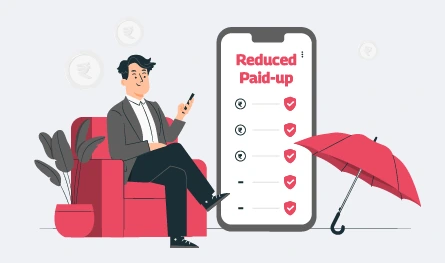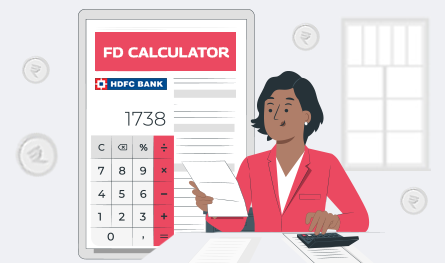What is Reduced Paid-up in Term Insurance? Check its Features & Benefits

In term plans, a reduced paid-up option implies that the insured continues to be covered under a policy for which the individual has stopped paying the premium. The coverage continues throughout the policy term. However, the sum assured received as death benefit gets reduced as per the reduced paid-up option.

What is Reduced Paid-up in LIC Term Insurance?
The reduced paid-up insurance feature under term insurance implies that Life Assured continues to enjoy plan coverage and benefits even after stopping the premium payment. So, this feature allows the insured to stop making the premium payment but to continue the life coverage under their policy. In this case, the death benefit in the form of the sum assured offered to the nominee of the insured is reduced (if the insured dies during the policy term) as per the cash value collected at that point. This unique facility is available under plans such as whole life insurance and return of premium policy. Further, its availability varies depending on varied plans and needs to be checked before buying.
How Does the Feature of Reduced Paid-up Work?
The feature of the Reduced LIC Paid-up policy works only when your LIC policy has attained the surrender value. If a policyholder misses the payment of the premium of their policy that has already acquired a surrender value, the policy will automatically change to a reduced paid-up plan. In such a case, the new sum assured that is paid to the nominee of the plan in the event of the death of the insured would be reduced according to the criteria of the Reduced Paid-up (RPU) Rider.
How to Calculate the Reduced Paid-up Value?
To calculate the reduced paid-up sum assured that is paid to the beneficiary of the plan in the event of death of the life assured during the policy tenure, we can use the below-mentioned formula:
RPU Sum Assured = (Premiums already paid/Premiums to be paid) * sum insured
Benefits of Reduced Paid-up Option
Here are some benefits of the Reduced paid-up policy:
- It allows policyholders to stop paying premiums of a term plan if the person is going through a financial crisis but wants to stay covered under the plan
- The amount that is saved by not paying the premium can be used to cover other expenses like buying household goods
- With a reduced paid-up policy, you can have peace of mind for securing your dear ones financially in your absence. Moreover, even if you can’t pay all the premiums for any reason, your nominee can still have a reduced sum insured after your death
- This plan will help people who are willing to save more on their retirement plans
- This plan can also help people who want to avoid surrender fees and other charges that insurance providers levy if you miss a policy premium
Why Should one Opt for the Reduced Paid-up Option?
Below are the reasons why people should opt for a reduced paid-up policy rider:
- If a person is going through tough times in terms of money, they should opt for reduced paid-up riders to avoid losing the benefits of a term plan. In such a situation, they can convert their plan to an RPU or reduced paid-up policy
- With the changes in the stages of life, you might experience corresponding changes in your financial planning. For instance, if you have purchased a new plan to suit your needs and think you do not require the old policy. In such case, you can convert the plan to RPU and stay covered under the policy
Is it Better to Surrender a Policy or Opt for a Reduced paid-up option?
| Surrender a policy | Avail reduced paid-up option |
|---|---|
| Surrendering a policy will not continue offering coverage to the insured after the policy is surrendered | Here coverage continues even after the premium payment has been stopped |
| No death benefit is paid to the family at the death of the insured | Reduced death benefit is paid to the nominee in case of death of the policyholder |
FAQs: What is Reduced Paid-up in Term Insurance?
It is not possible to revive a reduced paid-up plan under LIC. However, insurers keep coming up with several offers on revival from time to time. So, you may still have a chance if some new offer comes in the future.
The below formula can be used to calculate the reduced paid-up value for the LIC policy:
RPU Sum Assured = (Premiums already paid/Premiums to be paid) * sum insured
For example:
Policy tenure is 10 years
The number of paid premiums is 5
Sum assured is INR 1 lakh
Reduced paid-up amount = (INR 1 lakh) x (5/10 years) = INR 50,000
Yes, you can continue a reduced paid-up plan. For example, if the policy tenure of your plan is 12 years and supposed you paid premiums till 5 years of the policy. In that case, the feature of reduced paid-up in LIC would let you switch the plan and make your beneficiary eligible for reduced coverage under the plan.
Reduced paid-up in LIC means an option of receiving a reduced paid-up sum insured under term insurance. So, even if the policyholder has stopped paying the premiums for the policy but wants to continue the coverage under the plan, they can do it for the entire policy duration.
When it comes to preference, a reduced payment is preferred over surrendering a policy.

Author Bio
Paybima Team
Paybima is an Indian insurance aggregator on a mission to make insurance simple for people. Paybima is the Digital arm of the already established and trusted Mahindra Insurance Brokers Ltd., a reputed name in the insurance broking industry with 17 years of experience. Paybima promises you the easy-to-access online platform to buy insurance policies, and also extend their unrelented assistance with all your policy related queries and services.
Other Life Insurance Products
Latest Post
So, you’ve crossed the fabulous 60 mark. Retirement may be on the cards, your kids might be off doing their own thing, and suddenly your knees are making more noise than your WhatsApp notifications. Welcome to the senior citizen club.
Now let’s talk about something most of us tend to postpone until a doctor gives us a reality check: health insurance. If you are wondering whether buying health insurance after 60 makes sense, the answer is a loud and clear yes. This article will cover everything you need to know about it, how it makes sense, how it differs from health insurance for young adults, and what you need to look out for when checking for medical insurance above the age of 60.

.png)
April 2 is observed as World Autism Awareness Day and there is no better way to observe the day than to raise awareness of this condition and to promote kindness towards autistic people. Read on to know more.


Car depreciation implies the difference between the cost of a car at the time of buying the car and when you sell it. A car insurance claim amount is determined by the car depreciation rate. The car depreciation rate is the reduction in the value of your car over its lifespan caused by wear and tear.


Fixed Deposits (FDs) are one of the safest ways to grow your savings. HDFC Bank offers attractive FD interest rates, allowing you to earn guaranteed returns on your investment. But before you invest, it's important to know how much interest you will earn and what your final maturity amount will be.


If you think of life insurance, chances are you are picturing something people buy in their 30s or 40s. But what if you are 65 or older and just getting started? The good news is that you are never too late. Whether you are thinking of easing the financial burden on your family, covering final expenses, or simply leaving behind a legacy, there are life insurance options tailored just for you.
This article will be a guide to life insurance for senior citizens above 65 years, explaining why it is important, the type of insurance options, and how to get the right policy for you.




